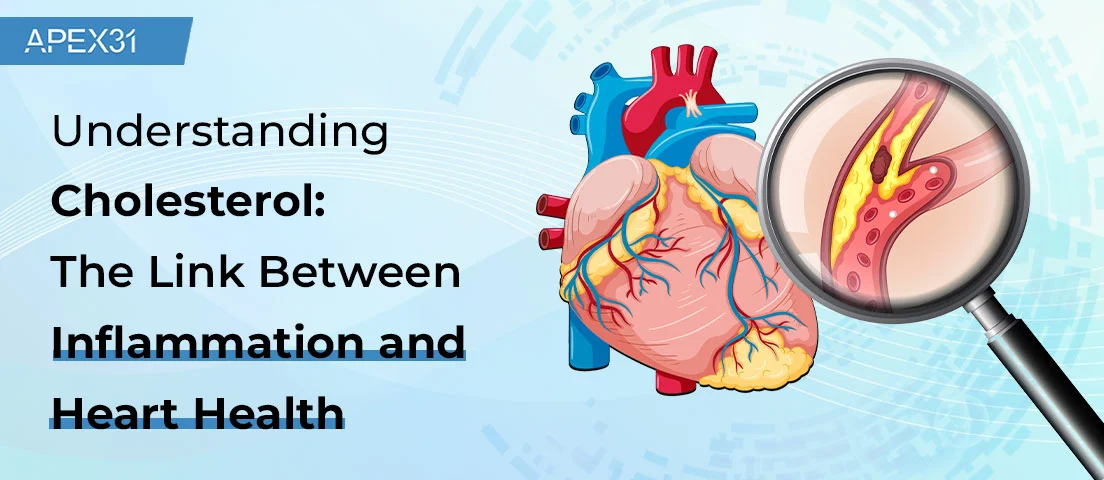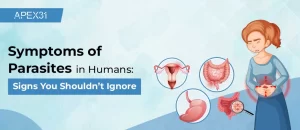Understanding Cholesterol: The Link Between Inflammation and Heart Health

High cholesterol is one of the most common health problems in the world today. In the U.S, nearly 24 million adults aged 20 or older have total cholesterol levels higher than usual, according to a report by the CDC. The rise in such cases has often been linked to poor dietary habits and sedentary lifestyles. People are now addicted to consuming diets high in saturated fats and processed foods. These unhealthy dietary habits contribute directly to elevated cholesterol levels in the body.
When cholesterol levels become too high, especially low-density lipoprotein, it starts to deposit in the walls of arteries. This build-up, known as plaque, narrows the path over time, which can restrict the blood flow or even block the arteries completely, giving rise to the risk of serious heart problems such as heart attack, stroke, etc. That’s why if you or anybody in your home is dealing with high cholesterol, you should not take it lightly and start improving your lifestyle. Understanding cholesterol and what causes an excess of cholesterol can help you make the right decisions about your health. So, let’s get started!
Understanding Cholesterol
Cholesterol is a vital substance found in every cell of our body. It plays a crucial role in building cell membranes. It also supports the production of testosterone, vitamin D, estrogen, etc. While it is important to maintain my body functioning, an excess of LDL, which is often called bad cholesterol, can lead to serious health issues, including inflammation.
Understanding Cholesterol’s Role in the Body
Cholesterol is naturally produced in our bodies by the liver. It is also found in the food items we consume. There are two ways cholesterol circulates in our body:
LDL (low-density lipoprotein): It carries cholesterol from the liver to cells.
HDL (High-density lipoprotein): It helps remove excess cholesterol from the bloodstream
How does Cholesterol cause inflammation?
Though cholesterol plays an important role in helping our body function optimally, when there is too much LDL circulating, it can start getting deposited on the walls of arteries. The immune system of our body starts detecting it as a threat, injury or foreign body and in defence starts attacking the plaque buildup with macrophages (white blood cells that clear out the infection). This response can irritate the blood vessels and eventually lead to chronic inflammation. This condition is known as atherosclerosis.
Causes of High Cholesterol
By understanding cholesterol and its contributing factors, you will be in a better position to take charge of your health. Here are the most common causes of high cholesterol:
1. Poor Diet
Consuming food rich in saturated fats and trans fats is one of the leading causes of high cholesterol levels. Such food items include products made with palm oil, fried food, packages snacks and drinks.
There are two types of cholesterol, as we discussed before: bad cholesterol vs good cholesterol. The food items that have saturated fats and trans fats in them increase your bad cholesterol. On the other hand, foods rich in unsaturated fats, fibre, and plant sterols can help increase levels of high-density lipoprotein (HDL) cholesterol, often referred to as “good” cholesterol. These foods include nuts, seeds, avocados, fatty fish, and certain types of oils.
2. Sedentary Lifestyle
A poor lifestyle can also contribute to the accumulation of bad cholesterol in our bodies. Exercising regularly or maintaining a good lifestyle promotes the production of HDL, the “good cholesterol” that helps clear out the excess of cholesterol from the bloodstream.
3. Obesity
Fat cells, especially those in the abdominal area, aren’t just passive storage spaces. They secrete substances that influence fat metabolism. They promote the liver to produce more cholesterol, including LDL cholesterol, which then circulates through the bloodstream.
4. Chronic Health Conditions
Certain health conditions make it harder for the body to control LDL cholesterol. These health conditions are mostly autoimmune disorders like diabetes, hypothyroidism, liver and kidney diseases.
There are other factors as well that can cause high cholesterol levels. These include genetics, age, smoking and alcohol consumption.
How to improve cholesterol naturally?
A clear understanding of cholesterol and its causes allows you to make well-informed decisions for your health and well-being. Here are some ways to reduce the production of LDL in the body and promote HDL.
Eat Soluble Fibre
Include foods like fruits, beans, and oats in your daily meals. These are rich in soluble fibre, a type of fibre that binds to cholesterol in your digestive system and prevents it from getting absorbed into your bloodstream. The more soluble fibre you eat, the less cholesterol your body retains.
Choose Healthy Fats
Replace the food sources loaded with unhealthy fats, like red meat and butter, with healthy fats from sources like olive oil, nuts, and fatty fish (like salmon). The latter food items help raise HDL cholesterol.
Avoid the Saturated Fats
Cut down the consumption of food items with saturated fats. These are mainly processed food items, sugary drinks, full-fat dairy items and red meat. Instead, go for lean protein options such plant plant-based food items or chicken.
Exercise Regularly and Lose Weight
Physical activity is one of the best ways to raise HDL cholesterol. Regular exercise also helps reduce LDL cholesterol and lowers triglycerides (another form of fat in the blood). Even simple activities like walking, cycling, or swimming for 30 minutes a day can help you stay active and lose unhealthy weight. By losing even a small amount of weight, you can lower LDL cholesterol and boost HDL cholesterol.
Manage Stress
Stress can trigger the production of the cortisol hormone, which can negatively impact your cholesterol levels. So, start indulging yourself in activities that keeps you away from stress.
Quit Smoking and Alcohol
Smoking can damage your blood vessels, elevating the chances of LDL getting deposited in your arteries. Quitting smoking will allow your blood vessels to heal.
Also, avoid drinking alcohol as it can put strain on your liver, which plays a crucial role in regulating the cholesterol levels in the body.
Summary
Cholesterol itself is not inherently a problem. It’s poor lifestyle choices and ignorance that can gradually deteriorate your health. Given our busy lifestyles, we are all at risk of elevated cholesterol levels. However, it’s important to note that making small changes to your lifestyle can help you stay active and healthy in the long run. For critical cases, it’s best to consult a professional. They have numerous ways to help your body heal naturally and quickly, including recommending supplements.



